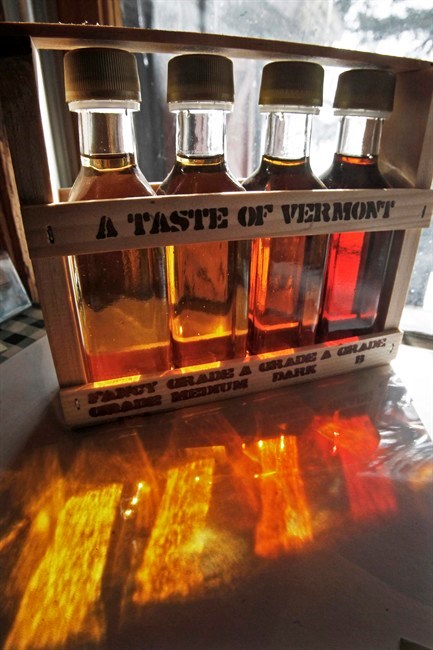MONTPELIER, Vt. - Would fancy grade maple syrup by any other name taste as sweet?
Vermont lawmakers are pondering that question as they consider whether to drop the state's traditional maple labeling system in favour of an international one.
The change pits tradition versus a desire to be a bigger player in world markets. Vermont is the No. 1 maple syrup producer in the United States, but its unique labeling standards put it at odds with the other big producers, including Canada.
The state Senate last week passed and sent to the House a measure to drop fancy, grade A medium amber, dark amber and grade B. (Fancy is the lightest and mildest, while grade B is the darkest and has the strongest maple flavour.) In their place would be several types sharing a grade A label, with descriptive phrases following: golden colour and delicate taste; amber colour and rich taste; dark colour and robust taste; very dark colour and strong taste.
Sen. Kevin Mullin, R-Rutland, initially argued against the measure before reluctantly going along.
"We should not be following everyone else in lockstep and ... giving them the ability to try to pretend that syrup made in another state is anywhere near as good as the syrup made in Vermont," he said.
Mullin later said he was mollified by assurances that the changes would be phased in over three years and that producers wouldn't have to throw out containers already printed with the existing labels.
State Agriculture Secretary Chuck Ross said the changes have largely been pushed by the industry, though the agency has conducted a series of public hearings to address the concerns of the more reluctant producers.
Thanks to improvements in technology and growing interest by landowners, Vermont's syrup production has roughly doubled in the past decade, to the extent that supply vastly exceeds any demand that would come from a state of about 626,000, Ross said.
"What's become clear is that the majority of syrup produced in the state of Vermont is sold in national and international markets," Ross said.
Vermont will maintain its distinct branding by labeling its syrup as coming from the state. Connoisseurs will continue to appreciate that Vermont regulations will continue to require boiling sap for longer than is the case elsewhere, producing a slightly denser product, Ross said. But to continue using a separate grading system would lead to consumer confusion, the secretary added.
Doug Bragg, an eighth-generation syrup producer from East Montpelier, said he was taking the changes in stride.
"Most of our customers are asking, why do we have to do this? There's a logic to it, no question about it," Bragg said. "It's still annoying though."
Back at the Senate office, where Lt. Gov. Phil Scott was chatting Friday afternoon with the five-member staff, there was broad agreement that people would get used to the changes. The only real debate was over the best grade.
Office assistant Roxy Quero said her preference was for fancy grade, but Scott said he preferred medium amber. Deputy Senate Secretary Steve Marshall said the darker the better for him.
"I usually go with grade B, grade C if I can get it, but you have to know somebody," Marshall said. "Grade C isn't sold as syrup at retail; it's usually use in baked goods or maple candy.
"I'd take double D if you gave me some," Marshall said.



